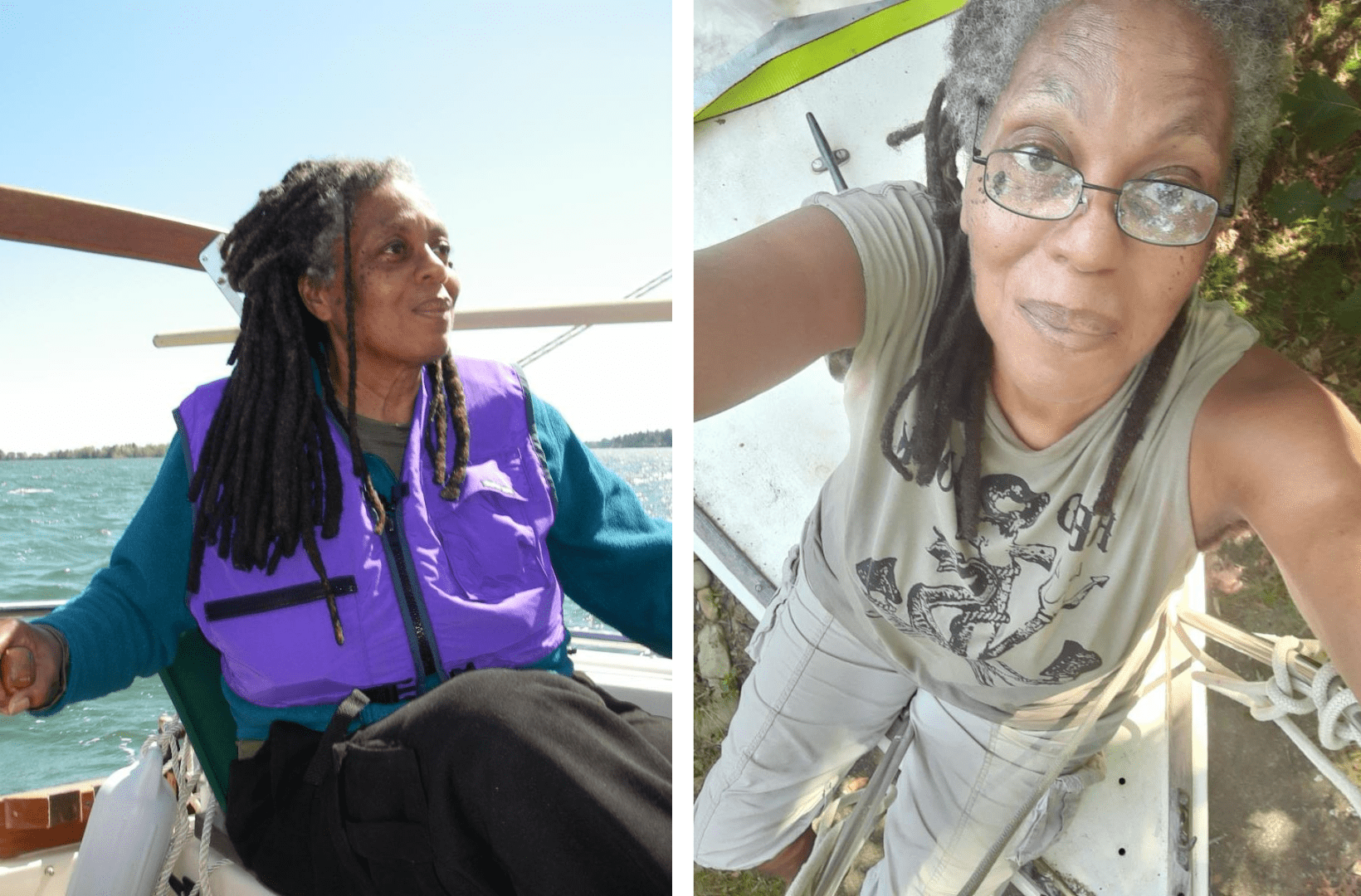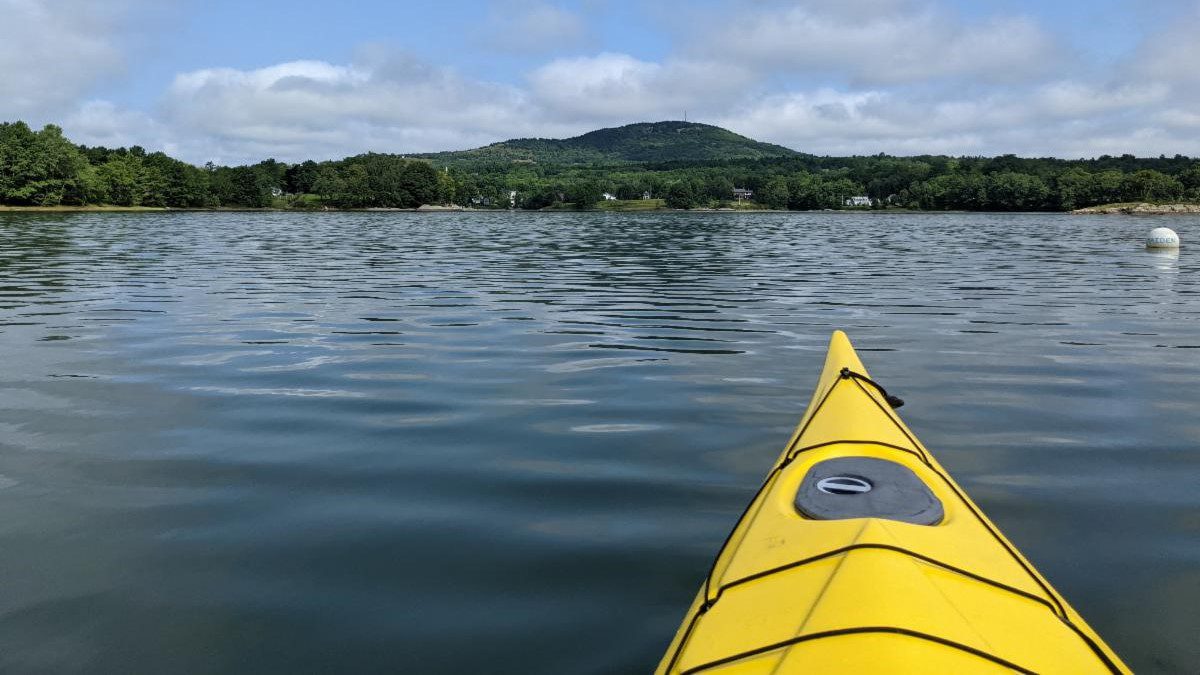Every summer, Janine Georgette — who goes by JG and uses “they” pronouns — tries to spend at least a month living on their sailboat, the Brenda B. The boat lives in Gouldsboro, in a friend’s backyard, while JG is in New York for much of the year caring for an aging parent. But they always look forward to returning to the water in Maine.
“It’s like the thing I most want to do in the year,” JG said. “When I’m sailing there, I always am so rejuvenated, and so… I don’t really have the words for it. But it heals, it definitely heals.”
JG is Black and in their 60s, and only started sailing about four years ago. They’d like to see more people of color out on the water and in nature in Maine, which is roughly tied with Vermont as the whitest state in the country.
“The Maine coast is just one of the treasures of the natural world, and yet you don’t find people of color there, for the most part. You really don’t,” JG said. “Being able to go to the water and be on a boat or a kayak, or taking a hike — that connection has not been nourished in our society.”
JG is one of the organizers behind the Ellsworth-area group Juneteenth Downeast, which held its first commemoration of the now-federal June 19 holiday in 2021.
This year, the group is holding a “Weekend on the Water” on June 17 and 18 at Lamoine State Park on the Mt. Desert Narrows. Focused on Black families and other people of color, the weekend will include free food, gear and support for camping, boating, hiking, fishing and swimming.
“We have a really complicated history with with the water. Historically, we’ve been kept out of the water, been kept out of pools,” JG said. “It’s hard to be comfortable on the water if you can’t swim. So part of our mission this year has been to create this opportunity for people to be comfortable in the water.”
JG wants people of color in Maine to come find community and connection.
“We’re about access to the natural world, because it will help you feel better,” they said. “It will heal you, will give you some respite.” And it offers a “baby step,” they said, into better environmental awareness and stewardship.

Juneteenth marks what the National Museum of African American History & Culture calls “our country’s second independence day” — the day in 1865 when news of the 1863 Emancipation Proclamation and the end of the Civil War finally reached a quarter of a million enslaved people in Texas.
“For me, it’s not a day of, ‘Oh yay, we were freed,’ because how many millions are still incarcerated?” JG said. “The ways in which slavery didn’t end, but evolved, is something that I think Juneteenth can address.”
JG pointed to the 13th Amendment, which outlawed slavery except as a punishment for a criminal conviction, and to disproportionate police violence against Black people. “This country has a lot to deal with that it’s reluctant to deal with,” JG said. “I feel like you can’t heal until the wound is clean and receiving fresh air and not sort of hidden.”
But that airing and healing is about more than negotiating with white Americans, JG said. “I’m much more interested in Black people and people of color doing for ourselves what we need instead of asking for it.”
The need that Juneteenth Downeast is focused on with this year’s weekend on the water is one for rejuvenation in nature, and inclusion in outdoor activities that many people of color may see as not being for them.
JG learned to swim as a kid, but had a vivid dream when they were young that was “really kind of traumatic… to the point I thought it was a premonition, of having my leg bit off by a shark. And so I stayed out of the water for a long time.”
They now wonder if this dream was a kind of genetic memory, which some scientists have theorized, passed on from enslaved ancestors brought over the sea by ship.
The Portland Museum of Art will have a free panel discussion on June 19, Juneteenth, about Black people’s relationship to water. Other recommended reading on this complex topic: “Enslaved Swimmers and Divers in the Atlantic World,” a fascinating essay by scholar Kevin Dawson.
When JG first began thinking of learning to sail, they said, “literally, my brain went through like five reasons why I couldn’t do it.”
They assumed, as they’ve heard many others do, that sailing was a hobby only for wealthy, white people.
“You give me a weekend and about $300, I can build a very small boat and sail. But who knows that? I certainly didn’t,” JG said. “So I think there’s an element of, I want people to see us out there.”
Juneteenth Downeast has raised money in Ellsworth and statewide to make its weekend on the water free for all. The group is among the first cohort of grantees to each receive $30,000 from the Outdoor Equity Fund, a new program from Maine Initiatives and the Nature Based Education Consortium.
“If you come and hang out and go camping with us and sing by the fire and discover what the fuss is about s’mores, and are looking at the night sky, you’ll get it. You’ll want it for yourself more,” JG said. “There’s something when just existing is enough.”
Register for the June 17-18 Weekend on the Water, or learn about volunteering and donating. Juneteenth Downeast will also commemorate the holiday itself that Monday, from 2 to 6 p.m. in Ellsworth’s Knowlton Park.







